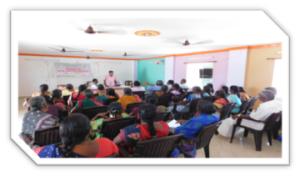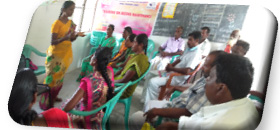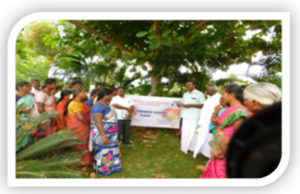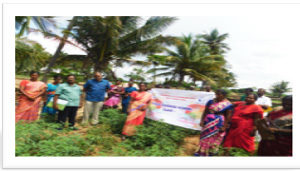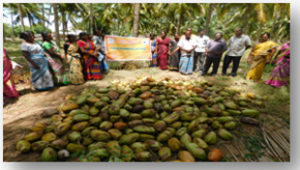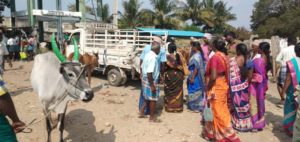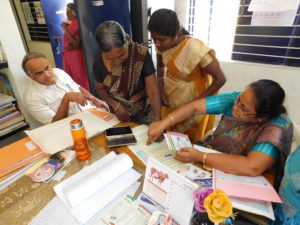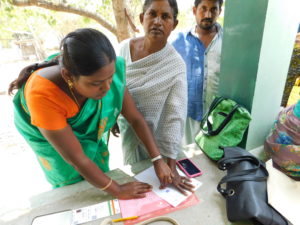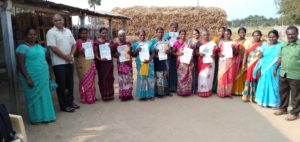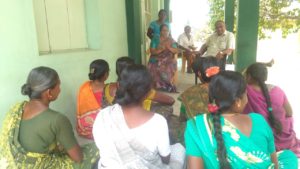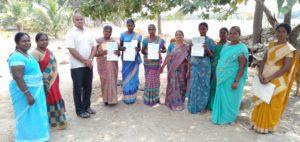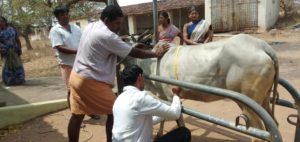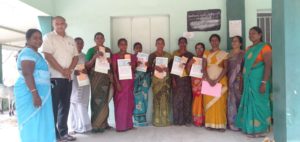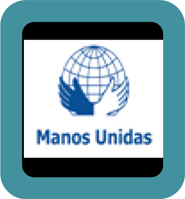
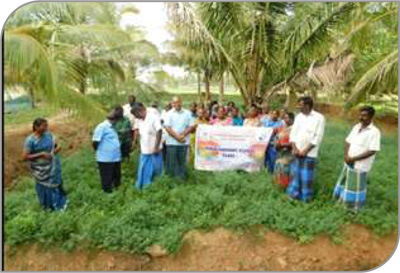 Background
Background
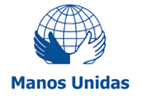 EMSF is funded by Manos Unidas. It is aimed at the empowerment of the farmers who are at the periphery of the society, particularly the women farmers. It is a three-year project. The overall objective of the project is “Livelihood security for marginalized farmers by increasing food production through sustainable agriculture activities.” We have now completed two years of this project.
EMSF is funded by Manos Unidas. It is aimed at the empowerment of the farmers who are at the periphery of the society, particularly the women farmers. It is a three-year project. The overall objective of the project is “Livelihood security for marginalized farmers by increasing food production through sustainable agriculture activities.” We have now completed two years of this project.
Project Areas
The project areas are Sankaragowdenpalayam, Sadayapalayam, Nandavanapalayam, Periyakumarapalayam and Maruthurvillages in Kundadam Block in Tirupur District.
Beneficiaries
There are 350 direct beneficiaries including women farmers and 3150 indirect beneficiaries in this project.
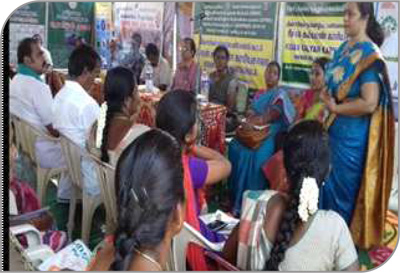 Activities
Activities
Advocacy Programme
Mrs D. Valarmathi ( joint director of Agriculture) presided over the programme. Mr R. M. Subramaniam (agriculture consultant of CEEMA) and Mr K. R. Julie Amt (director of Agri, Kundadam), block development officer Mr Manikandan, Mrs Arthi (Sericulture Department), joint secretary of Nehru Yuva Kendra and local Panchayat secretaries from our target villages and project staff had participated in this programme.
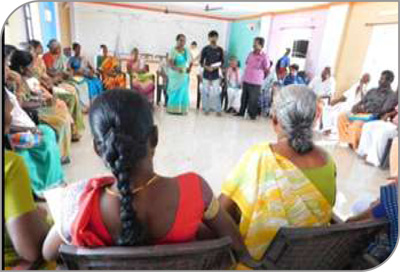
Creation of farmers’ Federation Group
In order to overcome the problems faced by the farmers, it was proposed to form interested groups of farmers with 20 farmers at village level and producer groups with 5 to 10 such groups. During this programme, a detailed discussion was held to finalize the modalities of the formation of such groups.
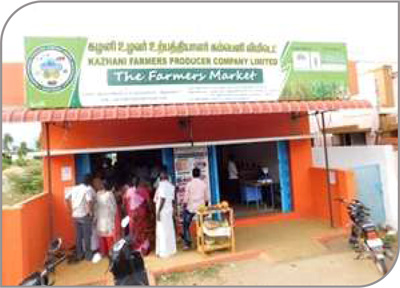
Training on agriculture Producer Cooperative
The farmers were trained to form small groups in order to register as a farmer producer company. This company will take the responsibility of fixing the prices of their products and market it. It will support the members with inputs for agricultural production, including seeds, fertilizers, fuel, and machinery services. It will also undertake transportation, packaging, and distribution, marketing of farm products (both crop and livestock). We were able to form 10 groups in ten target villages. They have contributed Rs.20,000/- in order to register the producer cooperative.
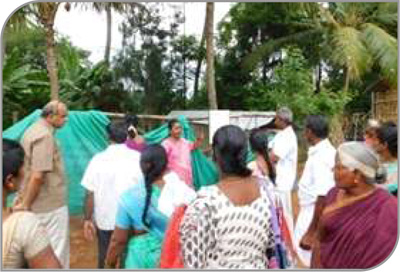
Training on agriculture marketing & sales
Mr K. R. Subramanian (ADA, Kundadam) delivered a special lecture on “Marketing”. A weekly market on all Saturdays is already functioning at Kundadam. The farmers of this area sell their products through local traders and the traders or middle-men get a large share of profits. The resource person stressed the importance of farmers
selling their products directly to the buyers.
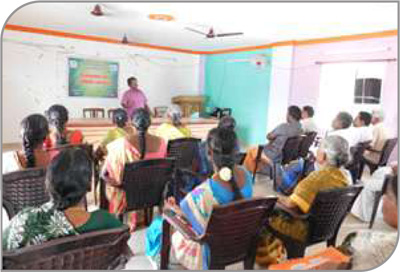
Workshop on climate change
Kundadam Block is one of the arid blocks in 13 Blocks in Tirupur District. Mr. R.M. Subramanian explained in detail about the climatic condition of this region.
Quarterly review & training of Federation members
Four quarterly reviews had been conducted at Kundadam and attended by representatives of farmers and staff.
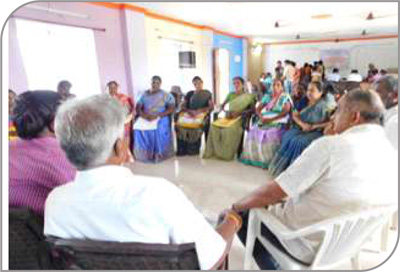
Training on animal husbandry
Animal husbandry is one of the secondary livelihood activities of our primary beneficiaries. The farmers have cows, buffaloes, goat and sheep and they earn from milk and meat. CEEMA in collaboration with Regional Fodder Research Centre, Chennai under Government of India distributed free fodder seeds to the participants.
Exposure visit for farmers – Gobi, 2018
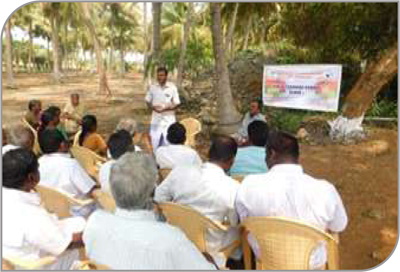
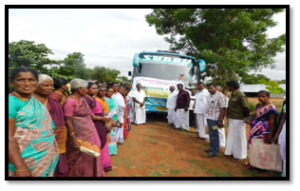 60 primary stakeholders from our project were taken to Myrada, KVK, Gobichettipalyam. Dr.Azhagesan (professor and head of the department) welcomed the gathering and explained about various activities of KVK. Training associates provided various field demonstrations of cultivation of millets, fodder crop, vertical farming, fan-pond, vermin-compost, animal husbandry, terrace gardening, etc. Dr Shiva (food scientist) explained and demonstrated the use of various types of machinery of millets processing.
60 primary stakeholders from our project were taken to Myrada, KVK, Gobichettipalyam. Dr.Azhagesan (professor and head of the department) welcomed the gathering and explained about various activities of KVK. Training associates provided various field demonstrations of cultivation of millets, fodder crop, vertical farming, fan-pond, vermin-compost, animal husbandry, terrace gardening, etc. Dr Shiva (food scientist) explained and demonstrated the use of various types of machinery of millets processing.
Training on value-addition of products – 2019
Though the farmers produce more in each season, their income does not increase sufficiently. One of the reasons for this is lack of knowledge on value-addition of the products. In order to overcome such situations, the farmers were taught to produce value-added products and market the same at a higher price.
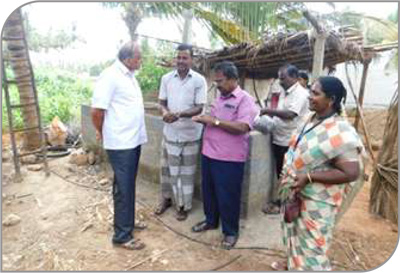
Establishing community nursery
 The vegetables available in the market are contaminated with pesticides. In order to overcome such problems and health hazard, the farmers are encouraged to cultivate vegetables with organic methods. To facilitate this, CEEMA had arranged a nursery at the premises of one of our beneficiaries and the seedlings were distributed to farmers. Our technical expert explained the planting techniques, various organic manures, pest repellents, etc. Hundreds of farmers were benefited through community nursery.
The vegetables available in the market are contaminated with pesticides. In order to overcome such problems and health hazard, the farmers are encouraged to cultivate vegetables with organic methods. To facilitate this, CEEMA had arranged a nursery at the premises of one of our beneficiaries and the seedlings were distributed to farmers. Our technical expert explained the planting techniques, various organic manures, pest repellents, etc. Hundreds of farmers were benefited through community nursery.
Weekly & monthly review meetings
 We have been conducting weekly and monthly review meetings regularly in order to ensure effective implementation of the project activities. Weekly review meetings were held at our project office at Kundadam where field staff and volunteers attend. During these meetings, each staff discussion the issues and concerns at the field level. Make plans for the forthcoming weeks. The monthly staff meetings were conducted at CEEMA office in Erode.
We have been conducting weekly and monthly review meetings regularly in order to ensure effective implementation of the project activities. Weekly review meetings were held at our project office at Kundadam where field staff and volunteers attend. During these meetings, each staff discussion the issues and concerns at the field level. Make plans for the forthcoming weeks. The monthly staff meetings were conducted at CEEMA office in Erode.
Training on record maintenance
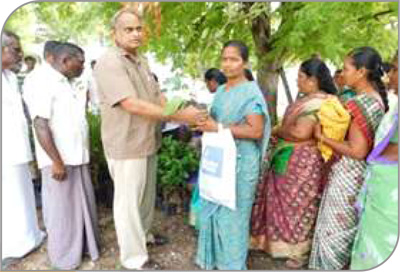
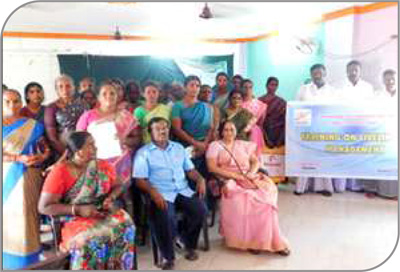
Training on Record Maintenance conducted at Kundadam for two days. About 30 farmers participated. Accounts and bookkeeping, meeting minute’s etc, .have been taught. Resource person for this training are Mr. R.M.Subramaniam and Mrs. Jegarani, Agri Officer, Kundadam, gave enough details about record maintenance. Mrs Dhanalakshmi, one of the beneficiary shared her experience and outcome of the record maintenance.
Field farmers’ school – 2018
The farmers’ school was organized in order to strengthen the capacity of the small farmers who normally do not get access to technical inputs. They were given inputs on various crops, variety, mode of planting, use of machinery, seed purchase, farm input purchase and integrated pest management activities till the harvest.
Mr.Nallakannu, from Spices Development Agency talked about issue of licence to farm produces. He stressed the importance of organically grown crops, and its marketing with specifications of quality, heritage, quantity and special characters of the produce.
Field farmers’ school – 2019
CEEMA organized the third session of Field Farmers School for 50 farmers on 05/01/2019.Mr. R.M.Subramaniam (Rted. JD) and Mrs D.Valarmathi (JD) were the resource persons. The government officials also explained about various government subsidy schemes to the beneficiaries. CEEMA staff collected the yield details of various crops from all the beneficiaries.
The beneficiaries cleared their doubts by asking many questions to the resource persons as well as the experienced beneficiary who shared their knowledge acquired from the field and media.
We have also conducted various training programs
-
Post Harvest Program:
CEEMA organized two training on post-harvest management for 100 farmers on 07/02/2019 and 08/02/2019 at Kundadam. Mr. R.M.Subramaniam (Rted. JD), Mrs. Maheshwari, Agri Dept and Mr. K.R.Subramanian, Agri Dept were the resource persons. Mrs. Maheshwari explained drip irrigation and its usage during post-harvesting. The resource person also explained about to value-added product form the harvest plants. Importantly took a session on a coconut tree and Drumstick tree post-harvest management CEEMA staff collected the yield details of various crops from all the beneficiaries. We can make high prize value addition products from the drumstick. Farmers can export foreign countries. Finally, R.M.Subramaniam, Retired J.D. Agriculture department, Erode has requested the farmers to start mini agro-based industries with agro-based raw materials.
Preparatory meeting for Third Year activities:
Mr. Sunil George Kurian (senior development consultant)had reviewed the second-year project activities of the project and planned third-year activities with the director and the staff. A questionnaire has been prepared to collect data to assess the impact of the project activities during the second year. Data will be collected from the following panchayats of Kundadam block.
Exposure visit and quarterly review meeting
Farmers’ field exposure visit was arranged toAyyakudi Guava Farmers Producers and Exporters Organisation and Vagarai Maize Research Centre. Fifty-five male and female farmers along with CEEMA director, project staff and Agri consultant have participated. The staff of the organization explained the process of formation of a producer organization, how they faced positive and negative experiences in dealing with guava producing farmers. InVagarai Centre, details of the use of organic and non-chemical fertilizers and pesticides for maize production were clearly explained to our farmers. The participants have also visited the Ottamchatram vegetable market and interacted with merchants.
EMSF quarterly review meeting with farmers was held at Kundadam on 20.6.2019. AD of the Agri Department explained government schemes. He appreciated the contribution of CEEMA in the field of agriculture.
Quarterly Review Meeting:
CEEMA had conducted Quarterly Review Meeting on 14.3.2019 with 30 farmers at Kundadam. Tmt. Mythli, Junior Inspector of field, Sericulture Department of Kundadam Block addressed the farmers and interacted with them. Mr. R.M.Subramaniam (Rted. JD) also interacted with the farmers and reviewed the training Farmer Field School 3rd Class and training on post-harvest management. Fr.Pushapanathan CEEMA Director reviewed each farmer how they used the post-harvest management in the field and how far it was benefitted to them, income earned and increased due to that practice. Tmt. Mythli, Junior Inspector of field, Sericulture Department explained the department schemes and subsidies to low-income profile farmers and women farmers.
Value Addition:
- Conducted two-day training on “Value Addition of Products at Kundadam. 50 women and men, farmers have participated. Details of value additions of crops, pulse and vegetables and government subsidy for storage of Agri products have been explained. Retired JD Subramanian and other dept officials participated.
- Advocacy & networking with Agriculture University/Govt. Depts. have been conducted @ Kundadam. About 50 farmers participated and cleared their clarifications on government subsidies, the latest technology in value addition, multi-crop cultivation, water distribution to each crop, storage for vegetables and fruits etc..Officials expressed concern that farmers should use the e-nam portal and Prime Minister Crop Insurance scheme. Agriculture, sericulture and horticulture department officials explained various schemes and projects.
Training on Record Maintenance conducted at Kundadam for two days. About 30 farmers participated. Accounts and bookkeeping, meeting minutes, etc, .have been taught.
- Training on sustainable agriculture
- Training on plant/crop protection management
- Training on technology-driven agriculture activities
- Training on livelihood resource management
- Training on bio-diversity
Distribution of Country Cows to Poor Women Farmers:
- Ceema selected with the help of Manos field staff the poor women farmers who will receive monetary help to buy a country cow for their livelihood.
- Ceema staff meticulously choose the beneficiaries by their regular participation in all the programs, implementing the methods, systems learned through training and brought out appreciable results.
- Fr.Pushpanathan, Ceema Director carefully went through the process and decided with the help of personal visits and authenticity of the documents.
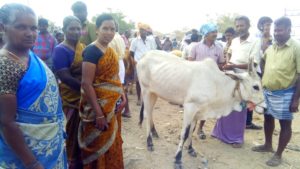 After the selection process over of course with the knowledge of the Director, the beneficiaries were informed to select the cow from nearby farms or Cow Sales Centers. ( Sandhai).
After the selection process over of course with the knowledge of the Director, the beneficiaries were informed to select the cow from nearby farms or Cow Sales Centers. ( Sandhai).- The beneficiaries with the help of mediators went personally to the Cow Sales centers to select and buy the cow.
- The Director conducted a preparation meeting with selected farmers where he elaborately explained to them about the process of agreement, financial share from Manos, future commitments to be fulfilled by the beneficiaries.
- Ceema planned to have distribution in the presence of its President Rt.Rev.Dr.L.Thomas Aquinas and Tirupur District Collector.
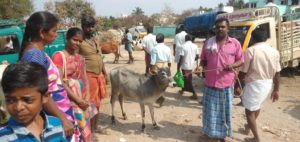 Ceema informed the staff to go personally to the Cow sales centers for the proper functioning of the program.
Ceema informed the staff to go personally to the Cow sales centers for the proper functioning of the program.- The beneficiaries and staff cooperated well in this process.
- Agreement paper had been prepared with the contents like each beneficiary should purchase a country cow, Insurance of the animal, Number marking on the animal’s ear, not saleable, first delivered calf should be given to the other poor member of the Manos, signing the agreement with the knowledge of two witnesses supported by Aadhar details, information to Ceema about sickness or death of the animal without delay and frequent updation to Ceema.
The signing of the Agreement and Distribution of Monetary help:
Ceema Director Fr.S.Pushpanathan, Program Officer Mrs. Roseline, and Ceema Staffs joined together did the agreement explanation and signing event. Staff meticulously arranged in such a way beneficiaries grouped at block level with their newly purchased country cows. The beneficiaries went through the document with an explanation of it and signed supported by two witnesses. Then the Director gave away the monetary help to them. This event was well concretized by the animal examination of Veterinary Doctor and applied injection to increase the immune power. This is followed by registered number marking on the ear of the animal.
Overall results
This is a three-year project and we have completed two years of implementation. There seems to be a lot of visible results after the implementation of the project. When we started the project, the farmers were unorganized and unaware of modern techniques for agriculture. Climatic conditions were also a great challenge. Our continuous training provided them with a lot of information and ideas and they became confident in experimenting with these.
The following are the summary of results.
- Training benefits are seen at the field level, especially in the preparation and use of vermin-composite.
- The farmers gradually reduced the use of chemical pesticides.
- Women farmers have become very active and attending training programs regularly.
- Good rapport with government officials and the agriculture department.
- Linkages with government schemes effectively.
- The supply of sapling through community nursery was highly appreciated by the farmers.
- Most of the farmers started a kitchen garden using organic farming.

